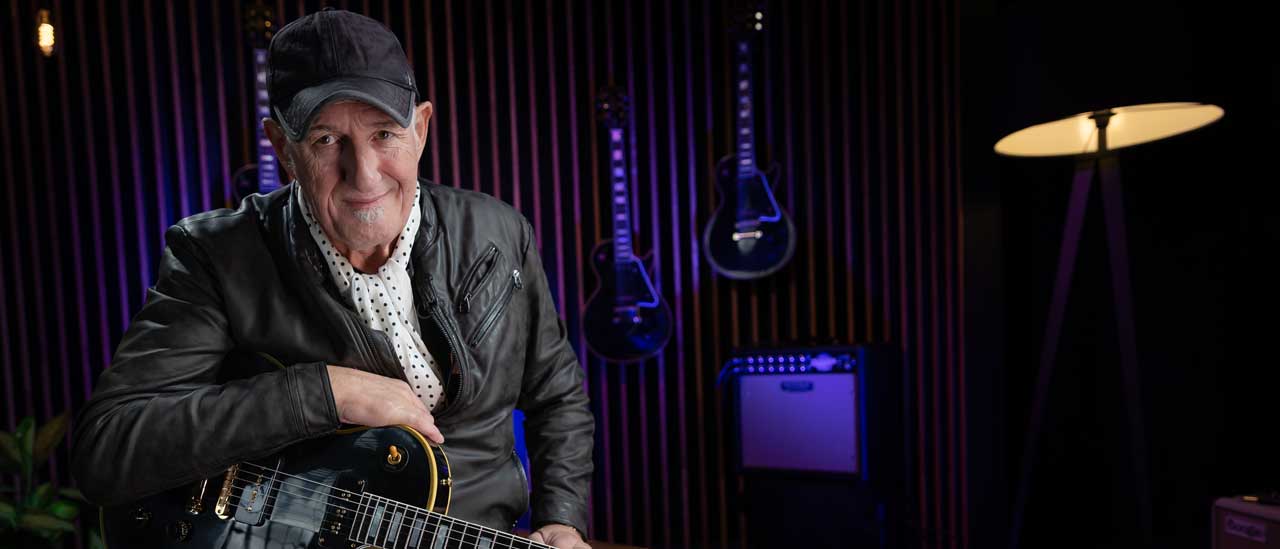Eddie Kramer: why I loved working with Led Zeppelin
Producer/engineer Eddie Kramer delights in the studio brilliance of Led Zeppelin – even though Robert Plant stole his girlfriend

Producer and engineer Eddie Kramer had manned the sound-desks for The Beatles, the Rolling Stones and Jimi Hendrix, among many others, by the time he recorded Led Zeppelin II in 1969. It was the start of a lasting relationship.
Some of the songs on Physical Graffiti – namely Black Country Woman and The Rover – were engineered by Kramer at Mick Jagger’s Stargroves Studio in May 1972. Kramer mixed Houses Of The Holy at New York’s Electric Lady Studios just a month later.

As producer, were Led Zeppelin in effect Jimmy Page’s band?
Oh, it was more than that. He was the bloody director. It was Jimmy’s concept, but then the person who should also get the same amount of kudos is John Paul Jones. I actually knew John more than I did Jimmy. He was very sweet and kind and he and his wife would invite me to their house in Hampstead, where I’d go and hang out with them.
John was always in Olympic Studios, dragging his B15 amp, his charts under his arm, his bass over his shoulder, conducting a whole bloody symphony orchestra. He was a genius arranger.
I think John called me up at the beginning of ’68, just before they left for America, and said: “Come on over to the house, I’ve got something to play you.” It was only an acetate of the first Zeppelin album! I went over and listened and, of course, it was amazingly heavy. I went: “What is this?” He told me they were called Led Zeppelin and I just said: “What a stupid bloody name.”
The next thing I know, it’s 1969 and the lads are over here in the States touring and I’m taking pictures of them at the Fillmore East. So they asked: “Why don’t you come and do some mixing for us on Led Zeppelin II?” I love those boys.
Sign up below to get the latest from Classic Rock, plus exclusive special offers, direct to your inbox!
Black Country Woman ended up on Physical Graffiti but was actually recorded outdoors at Stargroves in 1972. Was it recorded that way through pure happenstance?
Not at all. You have to understand something regarding Mr Page and the whole team, and that’s that there was really nothing that came down to happenstance. Everything was planned. In the grand scheme of things, there was always a theme behind everything.
We were in this bloody great mansion of Mick Jagger’s, the reason being that each room had a different sound, particularly if you were going for a big drum sound. At Stargroves there was a really lovely conservatory room, with big bay windows and a 15-foot ceiling. Bonham’s drums sounded fucking enormous when you were looking to capture songs like D’yer Mak’er.
In each room in the house you could put an instrument. I remember we ended up putting one of Jimmy’s Fender amps in the fireplace, with a microphone on it. And we might have had a bass amp in a closet somewhere. At that point, John had a great thumping bass amp. The whole idea of recording in a big mansion like that was to be able to separate the sound and have different sounds at your disposal.
So we thought that if that’s the backdrop, what else can we do? Well, let’s see. Maybe we should go outside where there’s no acoustics? Great idea! So we set up the boys on two stools, with Jimmy and John playing acoustic guitars. We did the basic track, then added drums and bass.
When it came to the vocal, someone suggested we do it outside. You know, yeah man, it’ll be nice and dry out there! It was all to do with the acoustics – or lack of acoustics – outdoors. Then of course just as we were about to do the vocal, there’s a bloody aeroplane flying overhead. So you hear the talkback at the start of the song, which is me going: “Oi! What about this aeroplane there?” And Robert just goes: “Nah, leave it!” I mean, it doesn’t get better than that.
In those days we’d leave the mistakes in. It was the same thing on Whole Lotta Love, where we left the vocal bleed in because it was a bit of a giggle. If you leave the right mistakes in, you can really build on things like that. On modern recordings, Pro Tools can get rid of every whisper and scratch, but I love all that hair around it.
Rock’n’roll was never meant to be pristine, so the stuff I love is the hairy-arse stuff. It’s simple. The bullshit radar of today’s kids is well in tune. Which is why I think each successive generation loves Jimi Hendrix, the Stones, The Beatles and, particularly, Zeppelin. There’s no bullshit; it’s straight from the heart and brilliantly played. The level of musicianship in Zeppelin was incredibly high.
What was that like to witness first-hand?
It was stunning. I was very fortunate to work with them on five or six albums and it was always a challenge, because they were so bloody good and driven to perfection. Sometimes the tracks were incredibly complex. Pagey used to rehearse with Bonham for hours, showing him different rhythmic things. But once he’d got it, it was completely locked. And that would give him the freedom to throw other things in.
We’d all laugh because he’d do these fucking ridiculous drum solos and wonder where they came from. But it all sprang from his innate ability to be able to take the direction Jimmy gave him, then add his own stuff.
And Robert Plant?
Robert had the ability to deliver almost an animalistic scream. He was the ultimate sex guy up front, but he had the chops to back it up with. The critics poo-poo’d him and said he was a bit of a wailer, but that was a load of balls. The guy was a bloody marvel.
You can’t separate the four parts of Zeppelin. Each one is integral to the other and you can never imagine them without Robert’s singing. He had tremendous range and was interpretative of the previous 50 years of blues shouts. He was from the Midlands; that was his working class hero, blues-screamer interpretation of all that.
When you think about the four of them, you had two highly skilled, highly trained musicians in John and Jimmy. Then you had Bonzo, the bricklayer’s hod-carrier. He was a big boy; you didn’t want to mess with him, especially when he was drunk. But then he also had a very gentle side, which was amazing. Those four characters were amazingly complementary.
Was The Rover done outdoors at Stargroves too?
No. The only song we did outside, to my memory, was Black Country Woman. When I came to Stargroves, I think we cut six or seven songs, including Houses Of The Holy, which they held back. That was a typical James Page move, because he felt it suited Physical Graffiti more. It was all part and parcel of him directing the whole thing.
I think I was only there a week to record all those songs, in between nice dinners and a few beers. Bonham was a character. He kept bursting in on me and my girlfriend one night when he was drunk. At the time I was kinda pissed, but I laugh about it now. And then of course Robert stole my girlfriend. mean, that was inevitable, right? You didn’t stand much of a chance when he was about.
This feature originally appeared in Classic Rock 149.
Freelance writer for Classic Rock since 2008, and sister title Prog since its inception in 2009. Regular contributor to Uncut magazine for over 20 years. Other clients include Word magazine, Record Collector, The Guardian, Sunday Times, The Telegraph and When Saturday Comes. Alongside Marc Riley, co-presenter of long-running A-Z Of David Bowie podcast. Also appears twice a week on Riley’s BBC6 radio show, rifling through old copies of the NME and Melody Maker in the Parallel Universe slot. Designed Aston Villa’s kit during a previous life as a sportswear designer. Geezer Butler told him he loved the all-black away strip.

